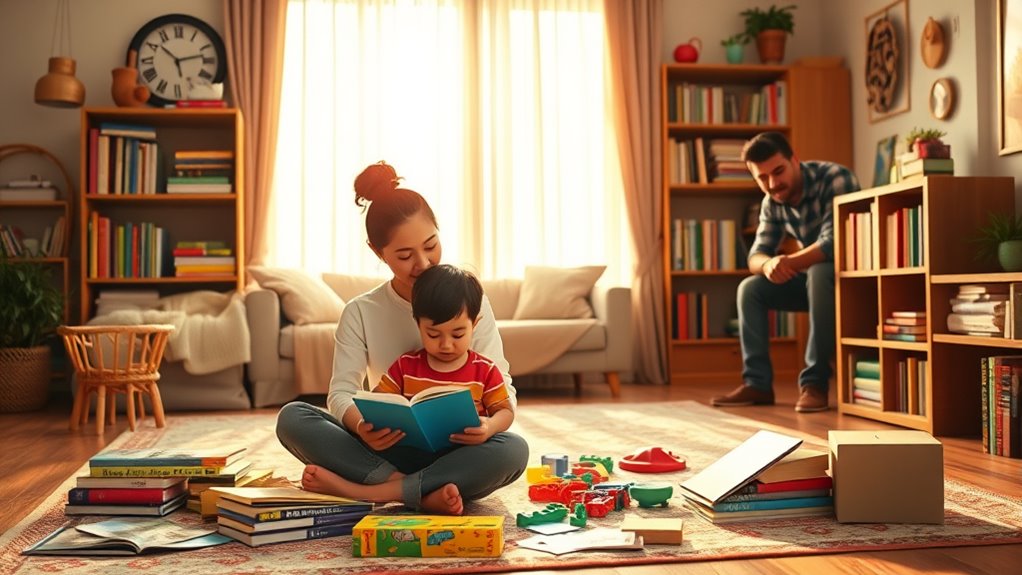To navigate parenting differences with your Filipina spouse, embrace open communication about your unique styles. Understand the value of hierarchical approaches alongside egalitarian ones. Involve extended family for support and perspective, and blend traditional values with modern practices to create a nurturing environment. Foster independence in your children while honoring interdependence rooted in Filipino culture. By addressing these dynamics, you’ll strengthen your partnership and create a cohesive family bond, paving the way for deeper insights ahead.
Key Takeaways
- Embrace open communication to discuss parenting values and preferences, fostering mutual respect and understanding between partners.
- Involve extended family in parenting discussions, leveraging their insights and support while balancing traditional and modern approaches.
- Use storytelling to impart moral lessons, aligning family values and teaching children about cultural heritage and emotional expression.
- Regularly check in with each other to address ongoing parenting challenges, ensuring both partners feel heard and supported.
- Establish a collaborative approach to discipline that respects each partner’s perspective while promoting consistency and teamwork in parenting.
Understanding Hierarchical vs. Egalitarian Parenting Styles

How do hierarchical and egalitarian parenting styles shape family dynamics?
Hierarchical styles, often authoritarian, emphasize strict obedience and discipline, with parents holding significant authority. This approach can create a family environment where communication is limited, leading to obedience but potential struggles with self-esteem and autonomy in children. Understanding the influence of cultural norms is crucial, as parenting styles are often shaped by societal values and expectations.
On the other hand, egalitarian styles, like authoritative parenting, promote mutual respect and open communication. Here, children participate in decision-making, fostering independence and higher self-esteem. The discipline is nurturing, focusing on teaching responsibility instead of mere obedience. Understanding these differences helps you navigate potential conflicts, allowing you to balance traditional values with modern approaches, ultimately shaping a supportive and harmonious family dynamic.
The Role of Extended Family in Parenting

While you navigate parenting with a Filipina spouse, understanding the role of extended family is essential. In Filipino culture, respect for elders influences decisions, often placing grandparents in advisory roles. They may even override parental choices, so it’s vital to involve them in discussions. Extended family members also act as a support system, sharing childcare responsibilities and providing temporary care when needed. This collaborative approach fosters family unity and strengthens relationships. As you engage with your spouse’s family, open communication will help manage differing opinions. Embracing this dynamic allows you to create a balanced parenting environment while respecting cultural traditions, ultimately benefiting your child’s upbringing and ensuring emotional and social support. Additionally, it’s important to recognize that parental authority can be delegated to extended family members under specific circumstances, which can further enhance support for your child’s development.
Balancing Educational Expectations and Support

Balancing educational expectations with support can be a delicate task, especially when maneuvering cultural differences in parenting. In Filipino culture, education is highly valued, often seen as a pathway to success. You might find that your spouse has specific expectations shaped by her upbringing, which could differ from yours.
Encourage parental involvement in school activities, as it enriches your child’s educational experience. Make an effort to understand both traditional values and modern approaches, as this balance can foster a supportive environment. Additionally, fostering financial literacy can empower your child to make informed decisions about their educational investments.
Open communication about educational goals is essential; it helps align aspirations within your family. By recognizing and respecting these cultural nuances, you can effectively support each other while nurturing your child’s academic journey.
Communicating Effectively With Your Partner

Effective communication with your partner is key to maneuvering parenting differences, especially when cultural backgrounds influence beliefs and practices.
Create a safe space for discussions, ensuring both of you can share thoughts without fear of judgment. Avoid assumptions; ask for clarification to minimize misunderstandings.
Encourage open dialogue about your parenting values and respect the unique perspectives each of you brings. Use positive language to foster cooperation and practice active listening by engaging fully in conversations.
Clearly communicate your expectations and manage emotions to prevent escalation during discussions. Regular check-ins can help you address ongoing issues.
Navigating Emotional Expression Differences

Maneuvering emotional expression differences can be challenging, especially when cultural backgrounds shape how feelings are communicated.
In Filipino culture, respect for elders and maintaining harmony often dictate emotional expression. You might notice your Filipina spouse values resilience, managing stress with a calm demeanor. This can clash with your own emotional style, so it’s essential to recognize these differences.
Encourage open communication about feelings, allowing both of you to express yourselves without judgment. Remember, your children will mimic your emotional expressions, so modeling healthy emotional regulation is vital.
Addressing Family Obligations and Responsibilities

While managing family obligations and responsibilities, it’s crucial to recognize the strong emphasis Filipino culture places on collectivism and interdependence.
In your relationship, prioritize mutual support and loyalty among family members. Understand that children are expected to assist and care for their elders, reflecting the value placed on respect and filial piety.
Be prepared to engage in discussions about financial responsibilities, as income pooling and supporting extended family are common practices. Acknowledge that traditional roles may influence how you both approach parenting and decision-making.
Encourage open communication about these obligations, fostering a collaborative approach to guarantee everyone’s needs are met.
Fostering Independence While Honoring Interdependence

Balancing independence and interdependence in parenting can be a rewarding challenge, especially within a Filipino cultural context that values both family cohesion and individual growth. Start by setting clear boundaries that help your children understand expectations while encouraging independence. Open communication is essential; it allows them to express their thoughts and feelings, building trust. Additionally, many couples who work together report higher satisfaction in their relationships, which can positively influence parenting dynamics. Maintaining consistent self-care practices can further support your emotional well-being, allowing you to be more present for your children. Incorporating mindfulness practices into your routine can help you stay centered and engaged in your parenting journey.
Promote skill development by encouraging them to solve problems independently, enhancing their confidence. Model independent behaviors yourself, showing the value of self-reliance. Support their decision-making by allowing them to make choices, fostering their autonomy. Simultaneously, emphasize the importance of family support and teamwork, showing them how interdependence strengthens relationships. This balance will nurture well-rounded individuals who respect both independence and family ties. Additionally, fostering emotional resilience in children can further aid them in navigating challenges and building healthy relationships.
Integrating Cultural Values and Traditions in Parenting

Integrating cultural values and traditions into parenting enriches your family’s dynamics, especially when blending different backgrounds. Emphasize the importance of honor and social harmony from Filipino culture, as these principles shape your child’s behavior and values. Additionally, family support systems can play a vital role in nurturing children within this cultural framework. Understanding the significance of trust issues can also help parents navigate challenges that arise in their parenting journey.
Involve extended family in discipline, reinforcing accountability and respect for authority. Use storytelling to impart moral lessons, fostering humility and responsibility. Encouraging open communication to guarantee your children understand the reasons behind discipline promotes emotional connection, while also ensuring they are aware of the importance of financial planning for their future. Furthermore, consider the role of apiculture in the community, as it fosters teamwork and responsibility among children.
Find common ground between your parenting styles, merging traditional Filipino practices with modern approaches. By doing this, you not only strengthen family bonds but also cultivate a nurturing environment that prepares your children for the complexities of life in a diverse world. Additionally, consider incorporating personalized message generators to help express love and values in unique ways that resonate with your family’s cultural heritage.
Frequently Asked Questions
How Can We Celebrate Both Cultures in Our Parenting Approach?
To celebrate both cultures in your parenting approach, actively incorporate traditions from each background.
Plan family events that highlight cultural holidays, and encourage your children to participate in activities from both sides.
Use both languages at home, fostering communication and cultural pride.
Share stories and values from each culture, allowing your kids to appreciate their diverse heritage.
What Are Common Parenting Myths in Filipino Culture?
You might think you know Filipino parenting, but myths can cloud your understanding. Many believe children must always obey elders without question, but that’s a misconception; balance is key.
Another myth suggests that overprotection is beneficial, yet it can hinder a child’s independence.
You might also hear about superstitions, like not kissing a sleeping baby, rooted in fear rather than fact.
Unraveling these myths can lead to a more balanced parenting approach.
How Do We Handle Disagreements About Discipline Methods?
When you face disagreements about discipline methods, it’s essential to prioritize open communication.
Sit down together and discuss your perspectives, focusing on your child’s needs.
Try to find common ground by blending your methods, allowing for structure while remaining flexible.
Respect each other’s experiences and values, and if emotions run high, take a moment to step back before reacting.
Ultimately, working as a team will strengthen your approach to parenting.
What Resources Can Help Us Understand Filipino Parenting Traditions?
To understand Filipino parenting traditions, you can explore various resources.
Start with articles focused on Filipino child-rearing practices, which highlight key cultural values.
Check out cross-cultural parenting blogs for insights into different styles.
Child development studies also shed light on how culture influences parenting.
Engaging in parenting forums allows you to connect with others and share experiences.
Finally, pick up cultural anthropology books for deeper insights into Filipino values and practices.
How Can We Involve Our Extended Families in Parenting Decisions?
To involve your extended family in parenting decisions, start by communicating openly about your goals and values.
Invite family members to share their perspectives, ensuring everyone feels heard.
Establish family traditions that foster unity and connection.
It’s important to set clear boundaries to prevent misunderstandings and maintain your authority as a parent.
Encourage active participation from your relatives in decision-making, as their experience and support can greatly benefit your children’s upbringing.
Conclusion
Steering parenting differences with your Filipina spouse can feel like a high-stakes game of chess, but with open communication and mutual respect, you can create a harmonious family dynamic. Embrace the blend of cultures, balancing traditional values with modern ideals. Remember, it’s all about teamwork—support each other in your unique approaches and celebrate the beautiful tapestry of your family. By doing so, you’ll not only raise happy kids but also strengthen your partnership.









